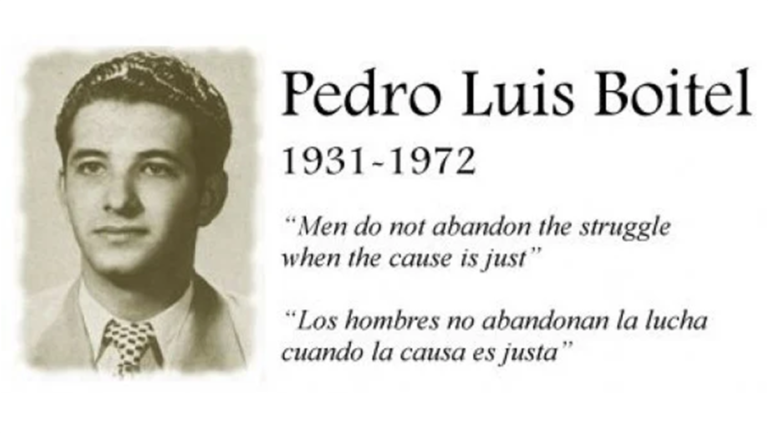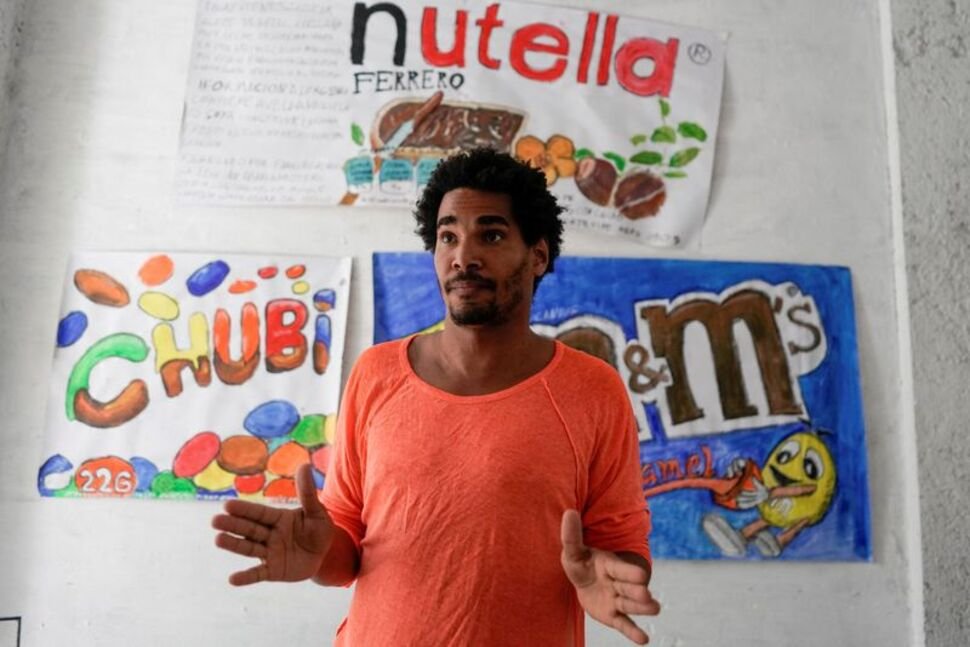Photo by Michelle Sague (OCB)
A vigil was held in front of the Cuban Embassy in Washington, D.C on May 25, 2022, from 5:00pm - 7:00pm to mark 50 years since student leader Pedro Luis Boitel Abraham died on hunger strike at the El Príncipe Prison in Havana where he was tortured. The individuals responsible for his death remain in power in Cuba, or have died after decades in power. Journalist Michelle Sague of Marti Noticias reported on this story, and took the above photo.
This vigil also highlighted the cases of other Cuban martyrs: Carmelo Cuadra Hernández, died in La Cabaña prison in April 1969 on hunger strike, after being tortured over eight and a half months. Carlos Costa, Armando Alejandre Jr., Mario de la Peña, and Pablo Morales shot down in 1996 by Cuban MiGs. Prisoner of conscience Orlando Zapata Tamayo who died on hunger strike in 2010. Cuban dissident Juan Wilfredo Soto Garcia was beaten to death by Cuban police in 2011. Ladies in White leader Laura Pollán died in 2011 under suspicious circumstances while hospitalized, and surrounded by Cuban state security. Oswaldo Payá Sardiñas and Harold Cepero Escalante were killed by state security in 2012. This is the tip of a large iceberg.
Vigil participants also called for the freedom of all Cuban political prisoners, and the image of Luis Manuel Otero Alcantara, and others were included to represent current prisoners of conscience. He has been in prison since July 11, 2021, and will be put on trial on May 30, 2022, according to Reuters.
This vigil outside the Cuban Embassy in Washington D.C. was an act of solidarity. It was a call for truth, memory, and justice or in one word accountability. The Washington Post in their May 23, 2022 editorial "To free Cuba, global solidarity is more important than U.S. policy" said that "the most important thing those outside the island can do for its people is to maintain unwavering, vocal solidarity with them — and moral clarity about the true source of their poverty and oppression."
BabaluBlog, May 25, 2022
50th anniversary of Pedro Luis Boitel’s death: the Cuban poet who fought both Batista and Fidel Castro
On this day in 1972, Pedro Luis Boitel died in prison from a hunger strike after the Castro dictatorship refused to release him after he finished serving an unjust 10-year prison sentence.
Via Notes from the Cuban Exile Quarter:
50 years ago today student leader Pedro Luis Boitel who fought against the Batista and Castro dictatorships died on hunger strike
Martyred student leader Pedro Luis Boitel fought by Fidel Castro’s side to bring an end to the Batista dictatorship and restore Cuban democracy. However, as Castro came to impose a communist regime, the student leader became a liability.
Pedro Luis Boitel was born in Cuba to a family of modest means of French origin. He studied at the University of Havana while working as a radio technician. He was also a poet. Opposing the dictatorship of Fulgencio Batista, he joined the July 26 movement led by Fidel Castro. The majority of the movement’s members, like Pedro Luis, were anti-communists.
Once Batista left for exile and Fidel Castro took control, the anti-communist members of the July 26 movement became an obstacle to absolute power. Following the revolution, Boitel returned to University, where his fellow students nominated him to run for the presidency of the Federation of University Students in 1960. Fidel Castro personally intervened to remove him from the presidency. Pedro Luis Boitel refused to betray the Federation of University Students. He sought to maintain academic freedom and autonomy. This made Pedro Luis an obstacle to the emerging communist regime.
As time went on and the dictatorial nature of the Castro regime became more apparent, the student leader became an opponent of Fidel Castro. Condemned to a decade in prison in 1961, he served the cruel and unjust sentence, but as the date of his release came and went, prison officials refused to release him. While imprisoned, Boitel continued to challenge the repression and the impunity of regime prison officials. He left a powerful impression on his fellow political prisoners. In 2009, Gregorio Asorio in an interview discussed how he first met Boitel while in prison for his opposition to the Castro dictatorship in the 1960s. Prison officials condemned black Cuban political prisoners for opposing Castro, thinking that they should be grateful to the dictator, and this thin man challenged the guards, declaring that Cuban blacks were part of the Cuban nation, and had helped found the Cuban nation in the struggle for independence. This man then cited Jose Marti’s quote that anything that divides humanity is a sin against humanity. Gregorio introduced himself and asked his name, and learned that he was Pedro Luis Boitel.
In response to the years of cruelty, torture, and now denial of his freedom, he went on hunger strike on April 3, 1972. Pedro Luis Boitel died fifty years ago on May 25, 1972, after 53 days on hunger strike in Havana at the Castillo del Principe prison. Academic freedom and autonomy ended in 1960 and were replaced with fear, repression, and ideological litmus tests to attend university. It has still not been restored today. He was buried in an unmarked grave.
Continue reading HERE.
U.S. News and World Report, May 24, 2022
Cuban Dissident Leaders Slated for Trial in Late May, Activists Say
By Reuters | May 24, 2022, at 1:45 p.m.
FILE PHOTO: Dissident artist Luis Manuel Otero Alcantara speaks during an interview at the headquarters of San Isidro Movement in Havana, Cuba, April 6, 2021. REUTERS/Alexandre Meneghini/File Photo
HAVANA (Reuters) - Cuban dissident leader Luis Manuel Otero Alcantara is slated to stand trial in a Cuban court at the end of May, activists said on social media this week, in a case that has attracted the attention of human rights groups who allege he and others have been unfairly detained and should be freed.
Cuban authorities have held Otero Alcántara, leader of the San Isidro Movement artist collective and dissident group, in preventative prison for nearly a year on charges including defamation of public institutions and national symbols, contempt and public disorder, according to court documents from March 8 viewed by Reuters.
Activist Anamely Ramos said on social media that Otero Alcantara and fellow dissident Maykel Castillo face as many as seven and 10 years of prison, respectively, in the upcoming trials. She also confirmed the court dates.
"They have set a date for the trial of Luis and Maykel, May 30 and 31. The lawyers received the notification," Ramos said on Facebook.
Otero Alcantara, in what appeared to be a recorded voice message posted late on Monday on the social media platform by Cuban activist Claudia Genlui, said he would continue "to stake his bet on freedom."
"During all these months, the regime has offered me exile outside of Cuba as the only way out of prison, otherwise I have to serve seven years in prison," Otero Alcántara said in the message.
The Cuban government did not immediately reply to a request for comment on the trials or Otero Alcantara's statements.
Cuban state media, including the ruling Communist Party newspaper Granma, have called Castillo and Otero Alcantara's San Isidro Movement part of a U.S.-directed "soft coup" attempt, charges they deny.
The cases of the two men have become a rallying cry for activists and human rights groups, who allege the communist-run government has ramped up repression in the wake of widespread protests on July 11 last year, believed to be the largest anti-government rallies since Fidel Castro's 1959 revolution.
Otero Alcantara was detained on the morning of July 11, while Castillo was detained two months earlier, in May 2021.
The government has said those detained before and after the July 11 protests have received fair trials, in accordance with Cuban law.
Human Rights Watch called the upcoming trials of Otero Alcantara and Castillo a "farce" on social media, while Amnesty International called them a "circus."
"The judicial circus against prisoners of conscience Maykel 'Osorbo' and Luis Manuel Otero Alcantara is announced for May 30," said Erika Guevara, Americas director of Amnesty International, on Twitter. "We demand their immediate release."
(Reporting by Dave Sherwood and Nelson Acosta in Havana; Editing by Matthew Lewis)
Copyright 2022 Thomson Reuters.
The Washington Post, May 23, 2022
To free Cuba, global solidarity is more important than U.S. policy
By the Editorial Board
May 23, 2022 at 2:06 p.m. EDT
Cuban President Miguel Díaz-Canel, front, takes part in a session of the National Assembly in Havana on May 16. (Irene Perez/Reuters)
After a Cuba policy review, President Biden has announced the easing of some sanctions that his predecessor, Donald Trump, imposed to punish the communist nation’s government for its human rights violations and support of a similar dictatorship in Venezuela. Mr. Trump’s actions had partially reversed a broader engagement initiated in the waning days of the Obama administration. Mr. Biden is now nudging policy back toward the Obama approach — very modestly. A $1,000-per-quarter cap on remittances to Cubans from family in the United States will end; nonfamily remittances will also be modified to allow payments to independent small businesses. Direct flights, by both charters and scheduled airlines, will be expanded and group educational travel reinstated. The U.S. Embassy will resume issuing family reunification immigrant visa applications, to clear a backlog of 22,000 applications. This might help channel Cuban migration through legal processes rather than the risky illegal path thousands are taking across the southern border.
The plan met with criticism from supporters of tough sanctions who — understandably — question the wisdom of enabling more cash to flow to Cuba, given that much of it will be siphoned off by the regime. Nor did Mr. Biden’s small-bore changes entirely please those who still believe greater engagement is the key to changing Cuba. It might help if all sides in this repetitive debate would acknowledge that U.S. policy does not have decisive influence on Cuba. The essential problem is the repressive conduct of the Havana regime, and its root cause is that regime’s unbending will to power.
Certainly that uncompromising attitude was on display on July 11, 2021, when President Miguel Díaz-Canel suppressed a spontaneous wave of street protests with overwhelming force. Hundreds were arrested. Estimates vary as to how many political prisoners have been put in Cuban prisons over the past 10 months, but Cubalex, a Miami-based nongovernmental organization, puts the count at more than 700. Like his close ally and patron, President Vladimir Putin of Russia — whose Ukraine invasion Cuba has not condemned but officially attributed to NATO’s alleged provocations — Mr. Diaz-Canel believes that popular protests result from U.S. meddling and must be crushed.
This is what Cuban communists have always believed, in times of rapprochement with Washington or in times of tension. On the day before the Biden policy changes were announced, the rubber-stamp Cuban national assembly adopted a “modernized” penal code. Among other repressive new features it threatens three years in prison for “insulting” high government officials. It targets independent journalists, who often receive support from abroad, by prescribing 10 years in prison for those who accept foreign funding “with the purpose of engaging in activities against the State or its constitutional order.”
Mr. Biden’s policy tweak might help Cubans who have access to foreign remittances withstand the harsh economic privation on the island, which is laudable as far as it goes. Meanwhile, the most important thing those outside the island can do for its people is to maintain unwavering, vocal solidarity with them — and moral clarity about the true source of their poverty and oppression.





